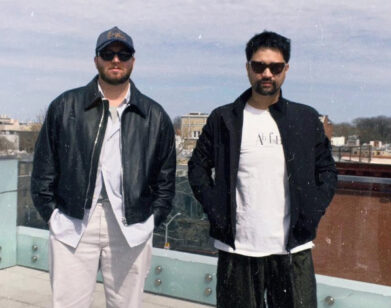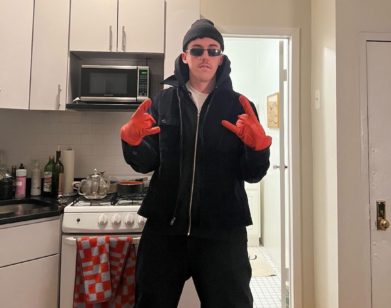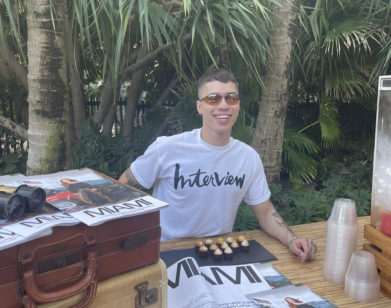Isa Mazzei Talks Sugar Daddies, Sex Work, and Sybians in Her Memoir Camgirl

Photo by Sara Baar. Art by Mark Burger.
Sex work is one of the oldest professions in the world, but it’s also one of the most misunderstood. In Isa Mazzei’s new memoir, Camgirl, she brings her experience with sex work to light, both as a sugar baby and a camgirl. After a eureka moment at a strip upon graduating college, Mazzei began honing her cam persona “Una,” through which she explored a range of kinks, from sadomasochism to Sybians. Mazzei quickly reaped the financial rewards of her work, while also finding it to be a therapeutic tool to address the trauma of her childhood. However, she also soon discovered the industry’s pitfalls, leading her to stage the on-cam death of Una, in which she drank an excessive amount of wine and bid farewell to her followers. “The more popular of a cam girl you are, the more viewers are watching you,” Mazzei told Interview. “That’s more and more chances for there to be trolls or people who are unsupportive of you or your boundaries in your room.“
Both Camgirl and Cam, the horror film she wrote loosely based off her experiences, attempt to change the national narrative surrounding sex work—in particular, the difference between sex work and sex trafficking. “Sex work is entered into by choice,” she says. “And the sex workers that I worked with were all people who had tons of different reasons for doing sex work, but they all chose it and all of their reasons were legitimate.” While Una may be dead and gone, the future for Mazzei remains entirely open.
———
EVALENA LABAYEN: I read Camgirl all in one sitting on the weekend and tore through it. I’m actually good friends with a couple of girls who do cam, so I found the experience to be really interesting, just learning about it from your perspective.
ISA MAZZEI: Thanks. I really appreciate that. I’m glad you read it because that’s what I want–something that’s fun to read.
LABAYEN: Were you surprised at how quickly your success was when you started sex work? You started as a sugar baby and then moved to camming.
MAZZEI: I think a lot of my success came two-fold. First of all, I had a lot of support when I started from the camming community who retweeted and promoted my new appearance online. But also, my sugar daddy was in my cam room for a lot of my earlier shows, and he helped in that way as well. I think in terms of finding a sugar daddy, that didn’t happen right away. It wasn’t actually, I think, as easy as it might seem in the book. I couldn’t give you a number, but it took dozens and dozens and dozens of men, messaging them, talking to them, kind of vetting them, and I think I owe a lot of my success to all of the research and preparation I put in before I actually started working. Thinking about what types of shows did the best, what types of shows I wanted to do, and things like that. It was a combination, but it certainly wasn’t something that I would say was easy. Camming from the get-go was the most difficult job I’ve ever had.
LABAYEN: When you mentioned how much money you made in the first month, I was really astounded.
MAZZEI: I definitely had nights where I made very, very little money to no money. Sometimes it’d be hours into a show and I’d have made $20. The highs are high and the lows are low. Looking at the majority, my cam viewers were very respectful, but that’s also why they don’t take up a large portion of the book, because they stay and interact with me how they’re supposed to and how I want them to. The ones where I start crossing boundaries or where they start crossing boundaries are the ones that interact with my life a little bit more. I do think that’s a common feature of a lot of sex work. It can be this feeling that clients want more from you. They want more of your personal life. They want to feel like they know you better than other people, and I think there’s this desire for this “real” that manifests in really troubling ways.
LABAYEN: Do you ever come up against people trying to shame you for this book or your past? I know there can be a certain type of expectation when it comes to talking about sex work.
MAZZEI: So far, my experience has been really positive. I think when people do react negatively to me or the book, I try to think of it as just, they’re wrong. They’re just wrong. There’s nothing shameful about sex work. There’s nothing bad about sex work or about choosing to do sex work, and I think that to try to make someone feel ashamed of the way they’re living their lives is more reflective of who they are than on anything that I’m doing.
LABAYEN: Absolutely. I think choice is a really important term that’s really brought through the book, because there’s a huge amount of agency you employed when you started camming.
MAZZEI: Sex work is entered into by choice, and the sex workers that I worked with were all people who had tons of different reasons for doing sex work, but they all chose it and were and all of their reasons were legitimate. I think more than this tendency to conflate sex trafficking with sex work, there’s also this tendency to kind of rank sex workers, as if forms of sex work or certain reasons for doing sex work are somehow more valid than others. That’s something else that I want to fight against—this perception that sex work for survival is somehow “less” than sex work to pay for grad school, for example. Any reason why someone chooses to engage in sex work I think is valid and should be respected.
I think also it’s a good thing for people to know that if people want to keep sex trafficking victims safe, they need to work to keep sex workers safe. They need to listen to sex workers when they tell them what is going to keep their communities safe, and keep them able to help those that maybe don’t want to be in sex work.
LABAYEN: Do you consider the book a guide?
MAZZEI: I think what works for me might not work for everyone. It’s definitely just my story in this world, but if it helps anyone in their camming career, then that’s awesome. I would love for people that aren’t in sex work to learn about it from the book. I think part of the goal of the book is to destigmatize and normalize sex work. I think having people relate to my character and to me as a sex worker is really important, and I would hope that does do some work to educate people about this world and this subculture and also hopefully build some empathy, where they can see themselves in someone that maybe they weren’t expecting to.
LABAYEN: One of the shows that Una puts on around the end was the do-anything-you-want show, and it was described by a friend as performance art. Do you think more sex work should be considered in that vein?
MAZZEI: Sex work is performance, and performance is art. I think that is how people want to classify their own work and their own art is really important, and should be respected, but absolutely I think a lot of sex work is a form of artistic expression.
LABAYEN: When do you think Instagram will stop banning nipples?
MAZZEI: Sex workers are at the forefront of this Free the Nipple movement. I think that freeing the nipple on Instagram is about so much more than sex work. It’s also about allowing women to have bodies that are not continually sexualized by the outside world. There’s such a dichotomy between when women are sexualized externally and when they’re allowed to actually sexualize themselves. We’re seeing more and more examples of women publicly owning their sexuality, publicly owning their bodies, and deciding when and how they’re going to be viewed as sexual objects. I think that’s the incredibly powerful thing about sex work, that the sex workers decide what their boundaries are. They decide how they’re going to be sexualized.
These platforms have such a problem with not only female sexuality in general, but also sex workers get shadow banned, and a lot of sex workers have their accounts deleted over and over and over again. This is often done under the guise of protecting sex trafficking victims, but actually all it does is harm the very people that they’re trying to protect and more than that, it stops the sexual community from being able to kind of keep each other safe and to communicate about things, like clients that are dangerous.
LABAYEN: Do you think camming is a profession that is open to all kinds of bodies?
MAZZEI: Absolutely. I think that if someone wants to cam, camming can be an incredible place of self-expression. There are so many performers that do so many different types of streaming, from camming to Twitch to YouTube-ing to being an Instagram influencer. The internet is this huge space where you can find your people. At the end of the day, it’s a symbiotic relationship. I’m building a community. I’m providing a service, and I’m being compensated for that service.
LABAYEN: I didn’t expect it to be so community-building, as you’ve described in your own experience.
MAZZEI: My story is one story in one little piece of sex work, and I think that’s why it’s so important for more and more sex workers in different areas of sex work to share their stories and to have their stories held and supported and retweeted and listened to by the community at large.






